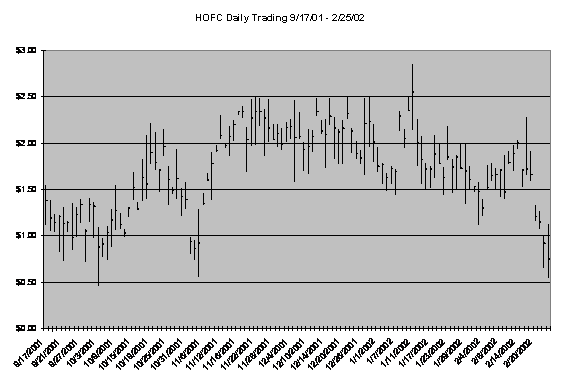Chapter 12 - In Play, February 26 - May 28, 2002 - Episode 1
Listen to podcast

After interviewing several banking firms, hackoff.com engages Barcourt & Brotherson both to give them an opinion on a fair value for the company and to “help them explore strategic options”. Although Larry insists that strategic options include the possibility of hackoff acquiring a company that would bolster its competitive position, none of the banking firms they talk to encourage this. They point out that hackoff stock is not worth much and that it needs what cash it has. Larry insists that the press release announcing the retention of Barcourt include this possibility and so it does.
Rachel Roth, the banker who led the team accompanying Larry and Donna on the roadshow for hackoff’s secondary offering, has been promoted once more and is the senior banker leading the team that will help hackoff manage the strategic alternatives process. She and a junior colleague, Grant Maxim, come to hackoff for a kickoff meeting with Larry and Donna. At the last minute, Larry decides to invite Dom Montain to the meeting as well.
Rachel is more full-figured, is dressed more expensively, and wears higher heels than during the secondary. She has a more commanding presence and speaks with more confidence. “We find it helpful first to put together a list of everyone — no matter how far-fetched — who might buy the company. Now that word is out that hackoff is in play, some offers will probably come in over the transom….”
“Yeah,” says Larry. “Actually, we heard from a couple of companies including Microsoft.”
“That’s good,” says Rachel. “That shows there is interest out there…”
“I told them they’re overpriced; we don’t want to buy them,” Larry adds.
There is silence until everyone realizes that this is a joke.
“I’m glad you’ve got a positive attitude, Larry; that’s important,” says Rachel. “Anyway, we don’t want to rely on just what comes in over the transom. Though you’d think everyone who should be interested would know about the opportunity and come out of the woodwork on their own, our experience—”
“Rachel, how many of these ‘strategic alternative’ exercises have you done?” asks Donna.
“Well, Donna, as you know, Barcourt has done more M&A work in the last year than any other bank except, of course—”
“I know what Barcourt has done,” Donna interrupts. “Remember, you gave us the nice pitch book with the slide full of logos of the firms that Barcourt has helped with M&A. My question is about you, personally. How much experience do you have in this?”
“I have been on the team for several major transactions,” says Rachel. “When I was interning, I…”
“When you were interning you were very green,” says Donna. “That was even before B-School. Have you had any real experience with M&A? I know Harvey Maklin has. I’m surprised he’s not here for this meeting. Frankly, I really thought that was who we were engaging.”
“Harvey will stay on top of this,” says Rachel. “He’s the VP responsible for hackoff as he’s always been. Obviously, he has much more experience with M&A than I do and hackoff will get the benefit of that experience. I have the day-to-day lead of the team, reporting to Harvey, of course. This is my most important transaction. I can and will do a good job for you on it, Donna; you have my word on that.”
The two women lock eyes.
“Look,” says Larry, “if you guys are through let’s get going. I don’t have a lot of time. Rachel’s done well for us before. She learns fast. She admits what she doesn’t know. I’m sure she’ll ask for and get help when she needs it. Right, Rachel?”
“Right, Larry.”
“And if that asshole, Harvey, doesn’t come through with the support you need, Rachel, then you’ll tell me that. Right?”
“You have my word on that,” says Rachel.
“Good. Now you were talking about a list.”
“Yes ... just sort of free thinking, no constraints, who do you guys think ought to be on the list?”
Junior banker Grant goes to the whiteboard prepared to write.
“Jesus Christ,” says Donna. “We pay millions of dollars so you can pick our brains and write down the answers? Don’t you have any ideas of your own? That’s what we’re paying you for.”
“We do have some ideas, Donna,” says Rachel, staying calm and pleasant. “I thought it would be more respectful to get your ideas first. I mean you ARE the experts in your business; we’re just bankers. But we can start with our list if you’d like.”
“So,” says Larry, “We have Microsoft, obviously. That means automatically there’s Oracle. Sun should be interested. If they could build real anti-hacker capability into their servers they might get some of the dot.com business back they’ve been losing.”
“Following up on that chain of thought, what about some of the Linux companies?” asks Rachel.
“Not likely,” says Dom, speaking for the first time since introductions. “They’re into open source. Open source security software doesn’t make a hell of a lot of sense.”
“Why’s that?” asks Rachel.
“Pretty dumb question,” observes Donna.
“Because then hackers could read the code,” explains Dom. “Then they’d know how to hack around what we’ve done. It is incredibly important that we keep our source code private.”
“I’ve got it,” says Rachel. “Thanks for the explanation, Dom.” She smiles at him and he smiles back involuntarily.
Donna grimaces.
They decide that Intel is not a prospective acquirer, too intent on staying out of the box and software layers. Cisco is a long-shot but worth talking to; Dom says the software could go on routers; in fact, that would be a good place for it. He warms to this idea as they discuss it.
Akamai is a possibility. They’re currently in the caching rather than the security business, but they do sell their technology on a service basis to e‑commerce companies. Dom says that, when Daniel Lewin was alive and CTO of Akamai, he always considered him one of the people that might develop competitive capability. They decide Akamai should definitely be on the list.
Global Crossing and Level(3) might be potential acquirers if they wanted to imbed the technology in their networks. They cross off Global Crossing because of its financial problems but leave Level(3), which has recently benefited from an investment by Warren Buffet that increased its stock price. From here, they decide that any telecom giant including the European and Asian carriers which has an extensive IP network could possibly imbed hackoff technology in its network and might want to buy hackoff for that reason.
Larry’s spirits visibly lift with each addition to the list. “If we have to sell,” he says, “looks like we should be able to get a good price.”
Donna, on the other hand, is doggedly glum.
“What’s the matter, Donna?” Larry asks her.
“I think you’re smoking dope,” she says. “We’re not going to be bought by AT&T or British Telecom or Telecom Italia. Just isn’t going to happen.”
“Why not?” demands Larry. “They could distinguish their networks; get out of having a commodity business if they put some of these smarts in.”
“Look,” says Donna, “if they need this technology so bad why haven’t we sold it to them up-to-now?”
“We’ve tried. We’ve called on most of them at one time or another. There’s been some interest.”
“Why haven’t we sold anything to them?” Donna demands.
“Frank says it’s because of corporate gridlock — they can never make a decision on anything big. They’re interested; we can always find some biz dev guy that’s interested. But we don’t get any further and the guy we’re dealing with can’t make a decision. So, after a while, we don’t waste time on them any more.”
“So why’s this going to be any different?” asks Donna. “Now we want to sell them not just a technology license but a whole company, and you think they’re gonna move faster? You think the biz dev guy whose phone number Frank knows is gonna write us a big check and buy the whole company?”
“Now,” says Larry, “we have Barcourt & Brotherson working for us. Right, Rachel? Now Harvey Maklin or even someone more influential, if such a thing is possible, picks up the phone and calls the CEO or whoever at one of these big telcos and says ‘boy, have I got a deal for you. This is something you gotta look at it. Gonna be your whole future.’ And the deal gets done. Isn’t that right, Rachel?”
“We’ll try,” says Rachel. “We’ll definitely try. We do have some good relationships in telco.”
“I’m not holding my breath,” says Donna.
“I don’t think telcos are a good idea, Lar,” says Dom.
“Why? You try to sell anything to them lately? What do you know about telcos?”
“It’s technically a bad idea, Lar. Our capability doesn’t belong INSIDE the network; it belongs out at the edge. That’s where all the innovation is.”
“What are you talking about?”
“The Internet works because it’s a ‘stupid’ network,” Dom explains. “All the telcos were working on their intelligent networks and along comes this stupid network, doesn’t know how to do anything except move packets around, doesn’t even know what’s in the packets, and all of a sudden the ‘intelligent’ networks that have all sorts of stuff built into them are crap. No one wants to use them for anything. No one’s developing anything for them. We didn’t; we developed for the Internet, right? Not AT&T’s intelligent network.
“There’s a guy named David Isenberg, used to work at Bell Labs. He figured all this out and wrote a paper on the stupid network. How the intelligent networks can only support the stuff that they were designed for and are also closed and proprietary systems — hard to work with. But on the stupid network, all the smarts are out at the edge. New applications no one ever thought of can be developed because there are no ‘smarts’ to get in the way. Innovation happens. Isenberg got fired from AT&T because of the paper. But he’s right. Everybody knows he’s right, except maybe some of the Bell-heads left at the big phone companies.”
“Very good point, Dom,” says Donna. “I’m impressed. So now we know that not only are the big telcos too slow to do business with but also they’d be dumb to put our stuff in our networks. I say they’re a waste of time. We should take ’em off the list.”
Grant stands questioningly with his eraser at the whiteboard, poised to strike the carriers from the list.
“Dom make a good point,” says Rachel. “I hadn’t heard all that before, but it’s very persuasive.” She smiles at him again and again he is forced to smile back.
“Leave them there,” says Larry. “We’re gonna try the telcos. Got nothing to lose. Even if Dom and this Isen guy are right, the telcos are too stupid to know. They gotta want something to distinguish their networks. How else are they gonna stay in business?”
“Maybe they’re not going to stay in business,” says Donna. “Maybe they’re going to go belly up because their networks are smart and their people are stupid. We do have something to lose: time. We’ve still got a company to run, Lar. Maybe we sell it; that’s going to take time. Meanwhile we’ve got to run it, and run it like we’re not going to sell it because maybe we’re not — and that also takes time. So I don’t want to waste a lot of time with dumb-ass telcos. That’s my take.”
“Donna, you’re right about the time,” says Larry, placatingly. “This isn’t gonna be a time-sink for us. Our friend Rachel here is going to check out the telco scene; she’s gonna get important bankers from Barcourt to call big shots at telcos, call them at the private numbers in their private jets; tell them they gotta do this. Pay us a lot of money. If it doesn’t work, we’ll be disappointed but that’s all. We don’t spend our time on it. Right, Rachel?”
“I’ll try Larry,” says Rachel. “Barcourt’ll try. But no promises on that. Can we talk about the data room?”
“Sure,” says Larry, “tell us about the data room.”
Rachel explains that preliminary meetings with prospects will be under non-disclosure and only after they sign a stand-still agreeing not to attempt a hostile takeover of hackoff.
“It’s important for hackoff to have this stand-still since the data you’re providing might be used as ammunition against you in a hostile takeover attempt. Most potential acquirers will agree to this because they don’t like to do hostile takeovers anyway, and this is a reasonable provision. If a good prospect won’t agree, well ... we’ll cross that bridge when we come to it. antihack might not agree to such a provision. That doesn’t mean you might not accept a reasonable bid from antihack, just means that you won’t give antihack any confidential information that could be used against you. The choice is up to them.”
She goes on to explain that, after the preliminary meetings, prospects will be asked for a nonbinding expression of interest including a proposed price. The bankers and hackoff management and the hackoff Board, if it cares to be involved, will select the top bidders and invite them to visit the data room. It may seem backward, Rachel explains, to ask them for their preliminary bids before they see the data that could help them decide how valuable hackoff is, but generally this data is too sensitive to expose to tire-kickers and she assumes this is the case here as well.
Dom wants to know how much about their technology goes in the data room. He has no problem with granted patents, he says, because they’re public anyway. But much of hackoff technology is highly proprietary. He would be very concerned if certain tech-savvy prospects saw it.
Rachel tells him this is often a problem in transactions involving technology companies. Sometimes, for competitive reasons, it’s necessary for the potential acquirers to hire independent experts to give them a valuation without giving them information they shouldn’t have since, if they don’t acquire hackoff, that information could give them a competitive advantage.
“I don’t think you understand how much of a problem this is,” Dom says calmly but forcibly.
“Why don’t you tell me then?” invites Rachel. “I want to learn.”
“Some of our stuff is so secret we don’t even patent it. We are much more worried about hackers finding out how our technology works than we are about competitors. The hackers are smarter, for one thing, and they would stop at nothing to learn how we’re keeping them out. That’s why we have so much security here. That’s why we protect our source code as if it were the crown jewels. We make sure no single employee knows the whole story and we treat ex-employees very well, even if we don’t like them, and still do the equivalent of changing all the locks when they leave.
“As Andy Grove said,” he continues, “paranoia is necessary and we’re paranoid as hell about our technology. How are we going to be able to set up this data room and still make sure our technology is properly protected? Just restricting access to consultants doesn’t do it for me. The next people they consult to may be hackers. I don’t know how Larry and Donna feel but this worries me.”
“Good point, Dom. I hope our bankers have a solution to this.”
“He’s right,” says Larry. “Rachel, what do you think? Do you have any ideas?”
“I’ll take this problem back to Barcourt,” says Rachel. “Thanks to Dom, I understand it very well. Basically, we have to find some way to describe the importance of your technology without compromising it. This could effect the value you get for it. I don’t like to say that but you’ll have to make a tradeoff, I think, between how much you’re willing to reveal and how much value people can attribute to the technology.”
“Not a very good answer,” says Donna. “That’s why we have bankers.”
“I’ll do the best I can,” says Rachel. “I have to be respectful of your constraints as well.”
“We’ll need your help on this,” says Larry. “We can’t compromise the security of how our stuff works.”
They go on to discuss financial information that will be in the data room. Legal stuff that has to be there. Organization charts. Equipment lists. No one will expect lists of unannounced customers, as providing them would run afoul of the Hart-Scott-Rodino Act. The Act says that the company must preserve its ability to remain competitive at least through the time when the Federal Trade Commission declares that a potential merger will not be opposed on the ground that it is anticompetitive and, actually to some degree, until the merger is consummated.
After the meeting, Larry stops Rachel on her way out the door. “Glad you’re working with us on this,” he tells her.
“Thank you, Larry,” she says. “I’m glad to be working with you and, uh, and with Donna again. Dom I didn’t really know before, but he seems very bright. We’ll—”
“I told Louise you were going to be our banker on this,” Larry interrupts. “Remember you met her — you and Ahmed — when we got off the plane after closing the secondary…”
“Of course I remember,” says Rachel. “She seemed very sweet.”
“Yeah... Well she suggested … she’d like to invite you and Ahmed to dinner. You still seeing him?”
“Yes. Yes, I am. Let’s do that. I’ll have to talk to Ahmed. Actually, he’s always been interested in meeting you but I didn’t want to impose. You want to email me some dates?”
“Right,” says Larry. “I’ll get with Louise and do that. Good. See ya.”
coming back later, set blookmark here | display next episode now »








